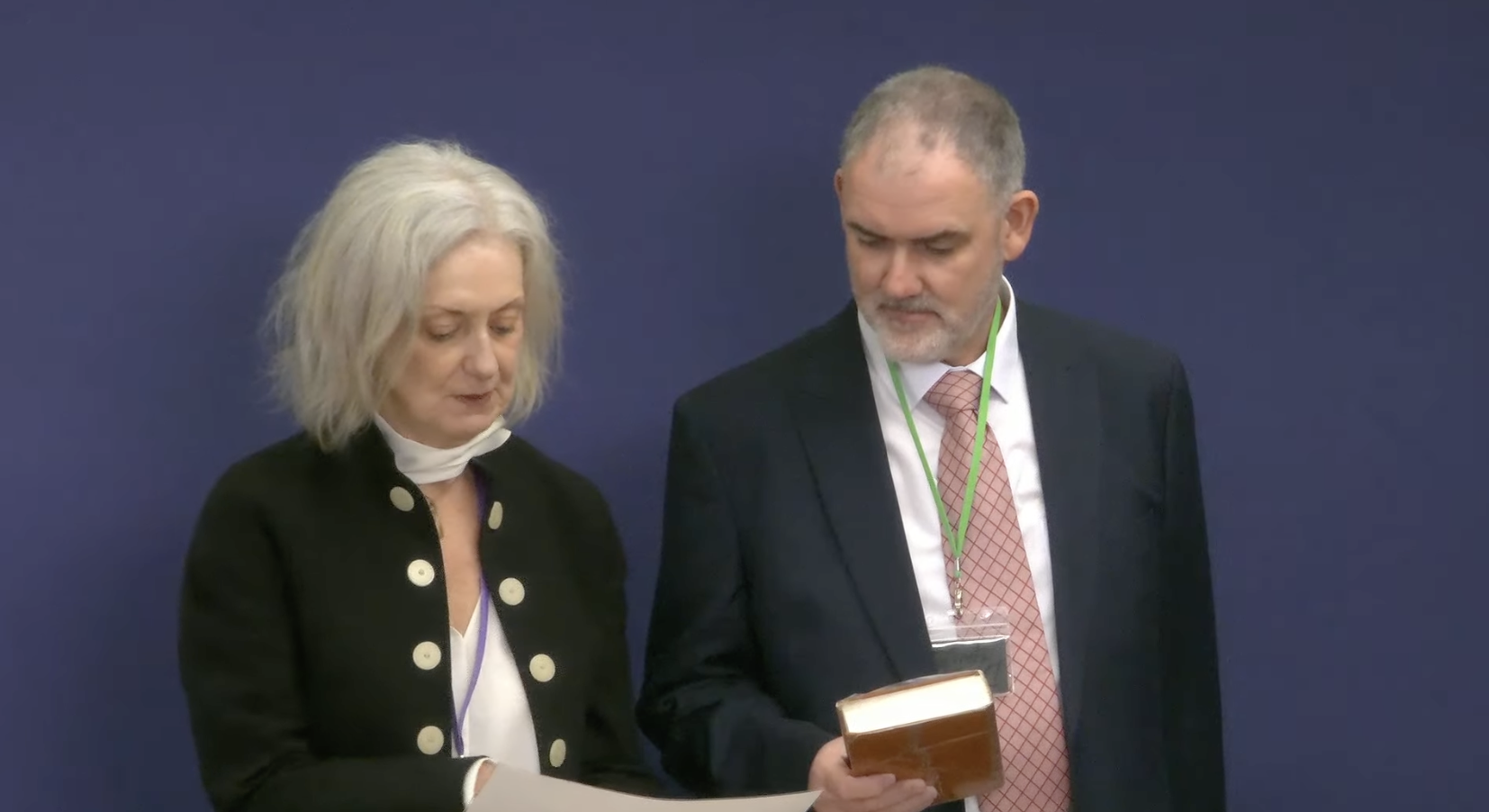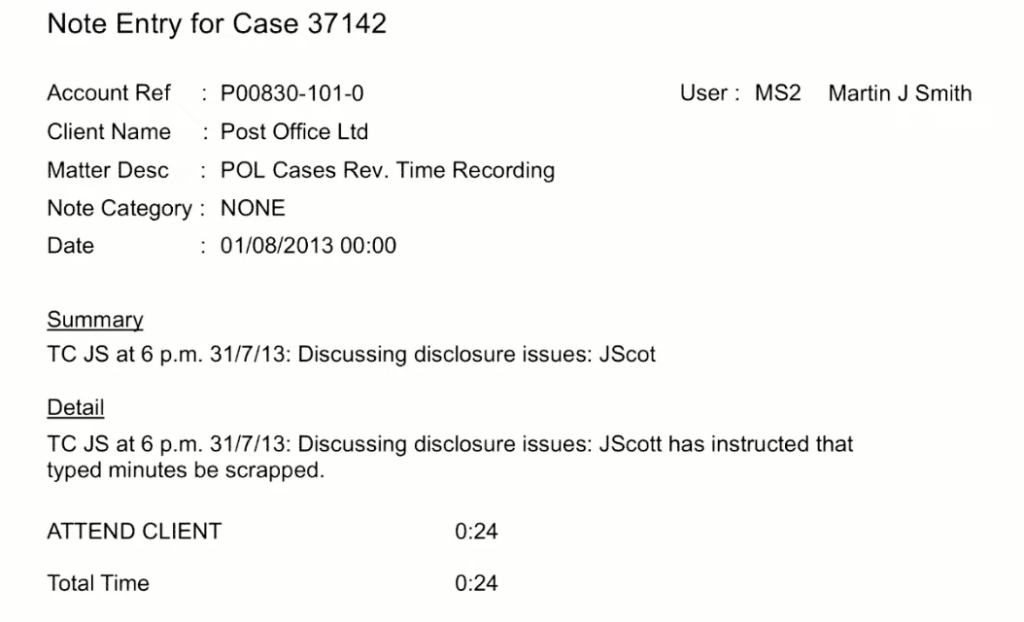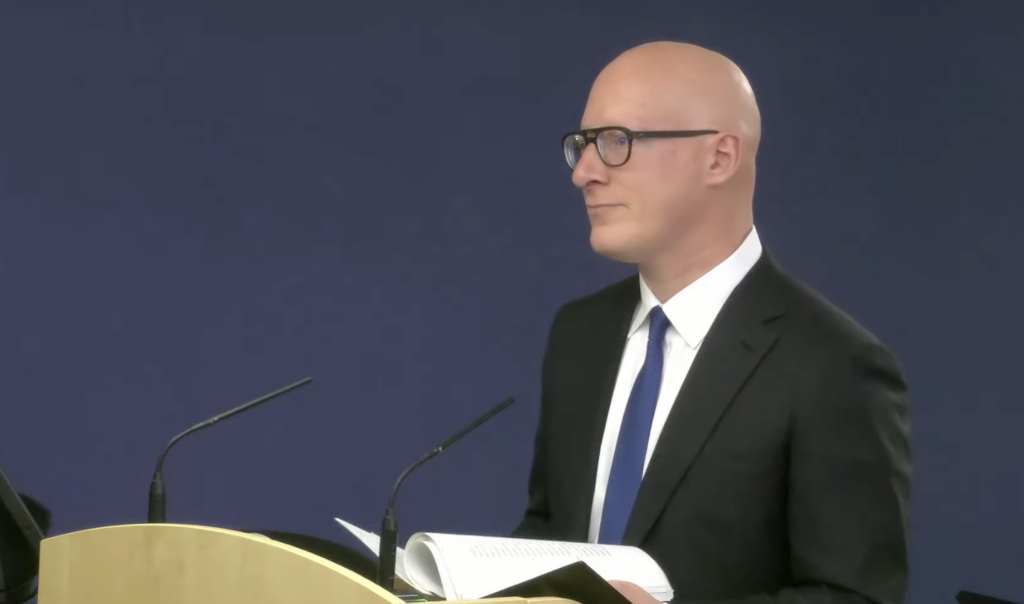
The mystery of who at the Post Office (or Bond Dickinson) decided to shred minutes relating to an important meeting at the Post Office to discuss problems with the Horizon IT system got a little more dramatic today as Martin Smith, a solicitor working for Cartwright King, gave evidence.
Smith was a prosecuting solicitor who took on Post Office cases under instruction from the Post Office. He had no training in the role having been a duty defence solicitor who then joined Cartwright King and moved to Post Office prosecutions after Cartwright King won the Post Office contract.
Smith was walked through his involvement in the case of Khayyam Ishaq, an innocent man who Smith helped put in prison. Smith did not read relevant documents and he made disclosure decisions which seemed to fly in the face of the relevant requirements. Nonetheless it was his evidence about the Post Office’s apparent desire to illegally shred documents relating to problems with Horizon which made the only two hacks in the Inquiry room – me and Fiona Parker from the Daily Telegraph – suddenly start paying very close attention at the end of a long day.
If you want to read my live tweets (lots of screenshots of documents and a blow-by-blow flavour of what’s happening) covering the entire day click here. Fiona’s live-blog (fewer posts, but plenty of direct quotes) can be found here.
Was it the external lawyers?
It is July 2013 – the Clarke Advice, written by Smith’s colleague, the barrister Simon Clarke, has been issued to the Post Office. The Clarke Advice was prompted by the realisation that Gareth Jenkins from Fujitsu was a tainted witness, and that some prosecutions were likely unsafe. To ensure all were across the risks going forward, Clarke had recommended setting up a weekly conference call between the Post Office’s IT, legal and security teams, their external lawyers Bond Dickinson and Cartwright King to monitor issues with Horizon to see if they affect any prosecutions.
The first meeting, known as the “Regular Call re Horizon issues”, opened (according to the minutes published on the Inquiry website) with a note from Rob King in the Post Office Security team stating “no minutes circulated, but we will be taking notes”. According to Smith, Andy Parsons from Bond Dickinson (later Womble Bond Dickinson who ran the disastrous Post Office defence of Bates v Post Office) explained that all documents would be kept on a central hub for reasons of keeping control of the dissemination of information.
In his witness statement, Smith said he thought this was a sensible idea:
“Mr Parsons expressed concern with regards to the difficulties which could arise following the circulation of minutes. He was particularly concerned that they could be further disseminated and attract opinion which might well be incorrect and also result in information being stored elsewhere without it being relayed back to the call. He explained that he had previous experience of such issues. It was evident that he was concerned about pre-action discovery in civil cases.
“My view from a criminal law perspective was that the information was to be reported to a single central hub in accordance with Mr Clarke’s advice – that was the very purpose of the call. I could also understand Mr Parson’s concerns that incorrect information could possibly be generated or that information might not be relayed back to the central hub.”
Was it the Head of Security?
Two weeks later, on 31 July, after the third Horizon Issues call, Martin Smith received a phone call from the Post Office’s (then) top criminal lawyer, Jarnail Singh. Smith was driving at the time. According to Smith’s note of the call, Singh told him:
“JScot [John Scott, the Post Office head of Security] has instructed that the typed minutes be scrapped.”
That’s the only contemporaneous statement available, but the call lasted 24 minutes. Julian Blake, asking questions for the inquiry, asked Smith what he remembered.

Smith replied:
“I can recall complaining to [Singh] about the influence being exerted over Post Office in my view by the external civil lawyers and I can also recall him telling me that an instruction had been sent out that typewritten minutes should be scrapped and that if anyone asks, the Cartwright King would be blamed for providing that advice.”
Smith reports being “absolutely horrified and shocked” by what he heard. He continued:
“When I had the opportunity to pull over, I was able to use another mobile telephone to record, at a distance, the latter part of the conversation. Because I was so shocked by what I heard.”
Smith recalled saying to Singh that he understood that no minutes were being circulated, and could see the benefits, but:
“by the third [Horizon Issues] call there was some form of change proposed… I don’t remember exactly what the change was, but I do remember saying on the call, ‘no – hold on… you still have to keep a central record’.”
Smith resolved to get Simon Clarke to write another Advice which spelled out “absolutely in black and white” the Post Office’s obligations to record information. Smith actually thought it was the civil lawyers [Bond Dickinson] trying to “water down” and “pull away” from the Post Office’s agreement to keep minutes in a central hub:
“By the time we got to the third [Horizon Issues] call to start having a position where we’re not going to have anything in writing… that did worry me. I was concerned about that.

Julian Blake wanted to know what Smith meant in his note by the word “scrapped”.
JB: From your understanding of that telephone call, was it that notes or typed minutes were to be “stopped” or “destroyed”?
MS: To be destroyed.
JB: Was that your clear understanding from that conversation?
MS: Yes.
JB: We know that in Mr Clarke’s Advice he uses the word “shredded” – do you know where that came from?
MS: I can only assume it’s arising out of my conversation with Mr Singh.
JB: And is that something you recall from your conversation with Mr Singh?
MS: Not at this point in time, no.
JB: So you don’t recall the specific word “shredded”, but you do recall that typed minutes were to be destroyed rather than there was going to be some kind of stop on taking future notes.
MS: That was very much my understanding…. Mr Singh told me that the minutes were to be destroyed – I can’t remember the exact phraseology….
JB: Were to be? Or had been? There’s a big difference between the two.
MS: I was under the impression that the instruction had gone out and that they had been.
Blake now wanted to know who the instruction had come from and who it had been sent to. Smith said he was definitely told it was John Scott who had sent the instruction out, but he was unsure who it had been sent to.
“I’m hesitant here because there were a number of people with the name David, and I’m thinking it was either David Pardoe or David Posnett [both in the PO Security Team], but I’m afraid I can’t… it was a long time ago.”
Was it the internal lawyers?
Blake wanted to know if Scott had “received advice on that matter or was acting on his own instigation.” Smith had no idea. Blake took him back to the third Horizon Issues call and wanted to know what had changed. Smith told him:
“I was left with the distinct impression that Post Office were no longer wanting to keep a record of the [Horizon Issues] calls, and I recall saying ‘No – you must still keep a central record…’.”
Blake cut in: “You say the Post Office. Who at the Post Office?”
“I think that was information that came from Rodric Williams”, replied Smith. “I think it was Rodric Williams who said that [and] I think I said “Rodric, you still need to keep a central record”, and I remember not being very happy about it and think this is one for Simon Clarke.”
All this begat the Second Clarke Advice, on shredding.
In summary, Martin Smith appears to be alleging that:
a) during the third Horizon Issues meeting on 31 July 2013, the Post Office lawyer Rodric Williams suggested not taking minutes. Smith remembers admonishing him, telling Williams he had to keep a record.
b) after the meeting, according to Smith’s recollection of his call with Jarnail Singh, a decision was taken at the Post Office to destroy the minutes anyway. John Scott had disseminated the order, and this was complied with.
c) Singh then called Smith to tell him of the decision and that if anyone queried it, Smith’s firm, Cartwright King, would be “blamed” for issuing the order.
According to Hugh Flemington’s evidence earlier this week, Scott and Singh did not get on. But something here doesn’t add up. Why would Scott take a unilateral decision to order the shredding of minutes? How could it possibly be accompanied by the suggestion that if word got out, Cartwright King would be blamed? What did Rodric Williams have to do with all this? And why did Simon Clarke’s shredding advice, once written and sent to the Post Office, sit in Rodric Williams’ desk for two weeks before being seen by Susan Crichton, the Post Office’s general counsel?
And why did none of them seem to give a flying monkeys about the Subpostmasters?
I am currently touring Post Office Scandal – the Inside Story. Please do come and see us as we make our way around the country (all dates here).
The journalism on this blog is crowdfunded. If you would like to join the “secret email” newsletter, please consider making a one-off donation. The money is used to keep the contents of this website free. You will receive irregular, but informative email updates about the Post Office Horizon IT scandal.

Leave a Reply